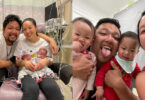A new mom asked a really good question on our Facebook parent group about how to engage family and friends who want to be supportive but who may not understand the “new normal”. Other parents shared some great tips in the group and via email which we thought we would collect and post here.
1. Your baby’s health and well-being and YOUR health and well-being are what’s most important. Other people’s feelings, while not completely unimportant, come second. Here’s a great article about the “Ring Theory” of support that makes this point really well.
2. Don’t be afraid to set limits for family and friends, and know that you can enlist NICU staff members to help if you’re having a hard time with this. We have created a list of tips for family and friends on our NICU website.
3. Everyone who comes to the NICU must respect the NICU’s policies regarding hand hygiene, privacy and patient confidentiality. Our babies need everyone to be on board with this, so if someone is not following our policies, please let staff know.
4. If people are bombarding you with requests for information, you can set up a blog where you share whatever information you choose. Some families use Caring Bridge because they like the privacy it offers, while others create blogs on WordPress or use Tumblr. You could also appoint a family member or trusted friend to be in charge of sharing updates. Some parents tell family and friends that “no news is good news” and say they’ll be in touch when they’re ready. The truth is, you don’t owe anyone information. If it will help you to share information, then do. If it opens you up to emotional risk to share, or if sharing becomes a burden for you, then don’t.
5. If people offer to help, be very clear and directive about what you need. If you need rides to and from the hospital, or cooked meals, or help with other children, let them know. There are some great online services that do the coordination work for you, like Take Them a Meal or CareCalendar. Remember that it’s a long road, and that you’ll need help when you’re discharged from the hospital as well. (And here’s a great article on how to help family prepare for discharge).
6. It’s up to you to decide how or if you want to celebrate the birth. Celebrations can be therapeutic, but only if you engage in them willingly. Remind family and friends that there will be many milestones and opportunities for celebration ahead, and you need to do what feels right for you now.
7. Only relevant knowledge is power. Many friends may try to share information with you about prematurity, but often that information isn’t helpful because it doesn’t really apply to you and your baby. Let your friends know that while you appreciate their interest, you prefer to discuss medical matters with the medical team.
8. Build structure or boundaries into visits. If you would like to see people but don’t have much time to spend with them, ask them to come for a fixed amount of time or for a structured activity. Invite them to the hospital for lunch or ask them to come with you on a walk.
9. Feel okay about putting some friendships on hold. Some parents say that certain friends, while they are fine people, just aren’t “good” at helping in hard times. This doesn’t mean that you can never be friends again, but it may mean you don’t worry so much about engaging them while you are hospitalized. Later on, when you are at home with your baby, you can decide how you want to proceed. One mom wrote, “Some old friends really disappointed me when we were in the NICU. They didn’t even try to get it. Now we are friends again but it’s a bit more superficial. That’s okay. There were other people who really showed us what they were made of and those are the friendships I treasure.”
10. For those family members and friends who do understand, and who do make you feel better and stronger, invite them in and introduce them to your “new normal” as soon as you feel safe and comfortable doing so. Inviting one does not mean inviting everyone. But opening up your experience to a trustworthy person can help you in many ways. It can remind you (in a good way) of your life outside the hospital. It can help your family member or friend understand what you’re going through and be a better support. It can help prepare you and your community for discharge. And it can make a long kangaroo care session fly by if you have someone to chat with while you’re cuddling your baby.
Have we missed anything? Let us know in the comments!







